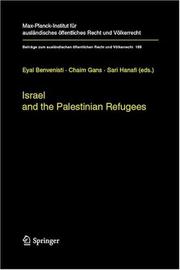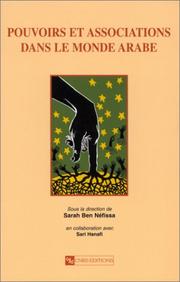| Listing 1 - 6 of 6 |
Sort by
|
Book
ISBN: 2905838361 2821821565 2905838647 Year: 1997 Publisher: CEDEJ - Égypte/Soudan
Abstract | Keywords | Export | Availability | Bookmark
 Loading...
Loading...Choose an application
- Reference Manager
- EndNote
- RefWorks (Direct export to RefWorks)
Palestinian Arabs --- Businessmen --- Businessmen, Palestinian Arab --- Regions & Countries - Asia & the Middle East --- History & Archaeology --- Middle East --- Ethnic identity. --- Palestinian Arab businessmen --- Business men --- Arab Palestinians --- Arabs --- Arabs in Palestine --- Palestinians --- Businesspeople --- Ethnology --- Syrie --- Égypte --- diaspora palestinienne --- Organisation de libération de la Palestine (OLP) --- Palestine

ISBN: 1280804130 9786610804139 3540681612 3540681604 3642444571 Year: 2007 Volume: Bd. 189 Publisher: Berlin ; New York : Springer,
Abstract | Keywords | Export | Availability | Bookmark
 Loading...
Loading...Choose an application
- Reference Manager
- EndNote
- RefWorks (Direct export to RefWorks)
This edited book offers diverse perspectives on the Palestinian refugee problem and the possible ways to facilitate its resolution. The book contains contributions of Israeli, Palestinian and other scholars, and its main goal is to initiate an informed dialogue that will bridge the “knowledge gap” between the different camps. The book is the cul- nation of a joint effort to assist people to realize how people on the other side envision the problem and the possible ways to resolve it, and to gain a comparative perspective on refugee problems and their reso- tion efforts in other parts of the world. The contributors come from - verse disciplines and backgrounds and their various contributions p- vide a comprehensive picture of the various aspects of the problem and of the possible means of its resolution. The Palestinian refugees problem is perhaps the most acute challenge to a peaceful settlement of the Israeli-Palestinian conflict. It is a challenge that scholars must address in a calm and detached manner, but at the same time a deeply emotional matter that even the most sophisticated scholars find difficult to engage without compromising their academic integrity. Despite these difficulties, we undertook the task of convening a meeting where the papers were presented and of the publication of this book because we think the contributions in this book provide p- spectives that contribute to the initiation of a constructive dialogue among the relevant communities.
Refugees, Palestinian Arab --- Israel-Arab War, 1948-1949 --- Arab-Israeli conflict. --- Government policy --- Refugees. --- Israel-Arab conflicts --- Israel-Palestine conflict --- Israeli-Arab conflict --- Israeli-Palestinian conflict --- Jewish-Arab relations --- Palestine-Israel conflict --- Palestine problem (1948- ) --- Palestinian-Israeli conflict --- Palestinian Arabs --- Palestinian Arab refugees --- History --- International Humanitarian Law, Law of Armed Conflict. --- Human Rights. --- International humanitarian law. --- Human rights. --- Basic rights --- Civil rights (International law) --- Human rights --- Rights, Human --- Rights of man --- Human security --- Transitional justice --- Truth commissions --- Humanitarian conventions --- International humanitarian law --- War (International law) --- Law and legislation
Book
ISBN: 019008748X 9780190087487 9780190087470 0190087501 0190087498 Year: 2022 Publisher: Oxford Oxford University Press
Abstract | Keywords | Export | Availability | Bookmark
 Loading...
Loading...Choose an application
- Reference Manager
- EndNote
- RefWorks (Direct export to RefWorks)
This handbook is currently in development, with individual articles publishing online in advance of print publication. At this time, we cannot add information about unpublished articles in this handbook, however the table of contents will continue to grow as additional articles pass through the review process and are added to the site. Please note that the online publication date for this handbook is the date that the first article in the title was published online.
Book

ISBN: 9791097093266 9791097093242 Year: 2022 Publisher: Marseille : Diacritiques Éditions,
Abstract | Keywords | Export | Availability | Bookmark
 Loading...
Loading...Choose an application
- Reference Manager
- EndNote
- RefWorks (Direct export to RefWorks)
Ce « miroir » propose des regards croisés sur les trajectoires de disciplines et de professions qui font les sciences sociales libanaises. Il interroge leurs formations historiques et les pratiques de leurs acteurs, ancrées dans la société et confrontées à des enjeux d'autonomisation et de reconnaissance. Ses différents chapitres entendent ainsi rendre aux sciences humaines et sociales libanaises leurs hommes et leurs femmes, leurs temps et leurs lieux, leurs pratiques et leurs défis. Ils mobilisent les ressources et les outils propres à différentes disciplines, de l’histoire sociale et culturelle à l’anthropologie des savoirs, de la sociologie des sciences à celle des intellectuels, en passant par la géographie et la science politique. Interrogeant la constitution d’histoires proprement libanaises de savoir, ils questionnent aussi la capacité de la communauté scientifique nationale à maitriser ses agendas de recherche aussi bien qu’à actualiser la vocation critique des savoirs. Ce faisant, les sciences humaines et sociales s’avèrent des postes d’observation privilégiés d’évolutions plus générales dans le Liban contemporain : la marchandisation du monde, la division internationale inégale des savoirs productrice de subalternisation ou au contraire de légitimation, la production et reproduction de normes, l’instruction de hiérarchies et d’inégalités, ou encore la mutation des mondes du travail.
Education --- Political Science --- Académie libanaise des Beaux-Arts --- ALBA --- université américaine de Beyrouth --- AUB --- anthropologie --- études urbaines --- études islamiques --- éducation supérieure chiite --- sciences de l'information et de la communication --- SIC --- université libanaise --- UL --- université Saint-Joseph --- USJ --- Lebanese Academy of Fine Arts --- American University of Beirut --- anthropology --- urban studies --- Islamic studies --- Shia higher education --- media studies --- Lebanese University --- Saint Joseph University


ISBN: 2271059194 2271128331 Year: 2020 Publisher: Paris : CNRS Éditions,
Abstract | Keywords | Export | Availability | Bookmark
 Loading...
Loading...Choose an application
- Reference Manager
- EndNote
- RefWorks (Direct export to RefWorks)
Le présent ouvrage se veut une introduction à un thème aujourd’hui fondamental : la place, la nature, les rôles et fonctions des associations et des ONG dans les pays arabes. Contribuent-elles à la démocratisation et au développement de ceux-ci ou sont-elles victimes des contraintes que les pouvoirs font peser sur la société ?
Nonprofit organizations --- Non-governmental organizations --- Associations sans but lucratif --- Organisations non gouvernementales --- INGOs (International agencies) --- International non-governmental organizations --- NGOs (International agencies) --- Nongovernmental organizations --- Organizations, Non-governmental (International agencies) --- Private and voluntary organizations (International agencies) --- PVOs (International agencies) --- International agencies --- politique --- association --- monde arabe --- pouvoir --- démocratie --- ASBL --- ORGANISATIONS NON GOUVERNEMENTALES (ONG) --- ASSOCIATIONS --- PAYS ARABES --- 20IEME SIECLE --- ASPECT POLITIQUE
Book

ISBN: 2709928019 2709928000 2813003034 Year: 2020 Publisher: Marseille : IRD Éditions,
Abstract | Keywords | Export | Availability | Bookmark
 Loading...
Loading...Choose an application
- Reference Manager
- EndNote
- RefWorks (Direct export to RefWorks)
Profound transformations are affecting the research systems around the world. We witness the emergence of new or restructured organizations to steer public research or promote innovation, new programmatic directions within these organizations, increased funding dedicated to research in academic settings, and new domestic and international partnerships and collaborations. A multiplicity of organizations and funding sources have appeared, creating a complex web where resources circulate along with knowledge in ways that are reshaping research systems in the South. This book gathers a large sample of these changes presented during a symposium organized by IDRC, IRD, IFRIS, and OECD, seeking to better understand their institutional, political and economic drivers. These cases document the building of scientific capacity and the broader use of results from scientific research and presents lessons for public policy. A large variety of case studies of specific research organizations and comparative analysis of the wider research system are presented in Asia, Africa, and Latin America.
Economics --- innovation --- développement --- politiques publiques --- économie --- Afrique --- Asie --- financement --- Amérique latine --- recherche publique --- Africa --- Latin America --- Asia --- development --- economics --- fundings --- public policy --- public research
| Listing 1 - 6 of 6 |
Sort by
|

 Search
Search Feedback
Feedback About UniCat
About UniCat  Help
Help News
News